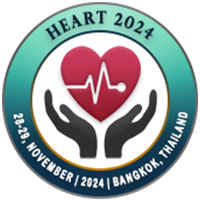
Syed Ali Hamza
Punjab Institute of Cardiology, PakistanTitle: Triglyceride-glucose index in patients of coronary artery disease presenting with or without cardiovascular event
Abstract
INTRODUCTION: Insulin resistance is a significant risk factor for coronary artery disease. A helpful surrogate test for insulin resistance is the triglyceride-glucose index, which measures how well glucose and triglycerides are metabolized. The triglyceride-glucose index, which is the combination of both indicators, has been observed to be highly connected with insulin resistance. Furthermore, it has been recommended as a viable surrogate measure of insulin resistance as a result of this significant correlation. The purpose of this research is to determine the frequency of cardiovascular event after coronary artery diseases and compare the triglyceride-glucose index in patients presenting with or without cardiovascular event after coronary artery disease.
METHODOLOGY: The study was conducted at the Department of Cardiology, Punjab Institute of Cardiology in Lahore from June 5, 2020 to December 5, 2020. Total 150 patients were enrolled in the study. A sterile syringe containing 5 millilitres of blood was used to withdraw the sample, and it was followed by an 8-hour period of abstinence before the sample was transported to the laboratory of the hospital for analysis of the lipid and glucose levels. Patients who had and did not have a cardiovascular incident had their reports evaluated, and the triglyceride-glucose index was determined for both groups. Statistical analysis using SPSS version 25.0 was performed on the data that was gathered. Triglyceride-glucose index was compared in patients with or without cardiovascular event by using independent samples t-test.
RESULTS: In patients having coronary artery disease, the frequency of cardiovascular events was 32, which represents 21.3%. The individuals who had a cardiovascular incident had a mean value of the triglyceride-glucose index of 9.48±0.52 and in patients of without cardiovascular event was 8.75±0.56. The level of triglyceride-glucose index was high in patients of cardiovascular event than the patients of without cardiovascular event when compared by using independent sample t-test the difference is significant (p=0.000001).
CONCLUSION: There is significant difference in triglyceride-glucose index in patients with or without cardiovascular event and the index is high in patients of cardiovascular event (p<0.05). On the basis of these results we recommend the regular screening of patients for triglyceride-glucose index in order to predict the adverse consequences after coronary artery disease.
Biography
To be updated soon...

